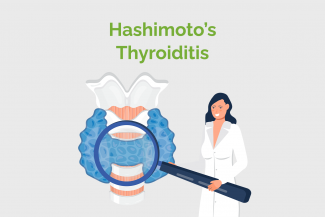Hashimoto’s thyroiditis, also called Hashimoto’s disease, is an autoimmune disease in which the thyroid is attacked by the body’s immune system, causing symptoms of hypothyroidism (underactive thyroid gland). It is most common among middle-aged women.

Symptoms
Many people with Hashimoto’s thyroiditis have no symptoms for years. An enlarged thyroid, called a goiter, is often the first sign of disease. The goiter may cause the front of the neck to look swollen. If large, it may cause a feeling of fullness in the throat or make it hard to swallow. It rarely causes pain. Hashimoto’s disease progresses slowly, leading to a drop in thyroid hormones.
Symptoms of an underactive thyroid include:
- Fatigue (a state of physical and/or mental weakness)
- Weight gain
- Pale, puffy face
- Feeling cold
- Joint and muscle pain
- Constipation
- Dry, thinning hair
- Heavy menstrual flow or irregular periods
- Depression
- A slowed heart rate
- Problems getting pregnant
Changed
31/Aug/2017
Community
Condition














